|
|
|
Sort Order |
|
|
|
Items / Page
|
|
|
|
|
|
|
| Srl | Item |
| 1 |
ID:
096693
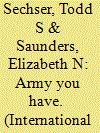

|
|
|
|
|
| Publication |
2010.
|
| Summary/Abstract |
Recent research suggests that a crucial factor in understanding the outcomes of military conflicts is the extent to which militaries are mechanized-that is, their relative dependence on tanks and armored vehicles compared to manpower. Since World War II, militaries have become increasingly mechanized both among the great powers and in unexpected quarters of the developing world. Yet the extent of military mechanization varies widely across states. Why have some states adopted highly mechanized force structures, while others have not? This paper tests several hypotheses about the determinants of military mechanization. One perspective suggests that strategic factors-including the force structures of adversaries and neighbors, recent combat lessons, and internal insurgency threats-shape a military's mix of manpower and vehicles. A second set of hypotheses points instead to domestic institutions such as democracy and civilian control of the military. Still other theories emphasize economic forces and international norms. To test these and other hypotheses, we construct a new data set containing mechanization rates for more than 150 militaries from 1979 to 2001. Broadly, we find significant support for the strategic perspective and little support for domestic institutional explanations. In addition, the results suggest systematic and predictable differences in the ways states structure their militaries in response to security pressures.
|
|
|
|
|
|
|
|
|
|
|
|
|
|
|
|
| 2 |
ID:
096694


|
|
|
|
|
| Publication |
2010.
|
| Summary/Abstract |
Much of the existing literature has accorded the Security Council with collective authority to confer legitimacy on actions involving the use of armed force. However, because of the veto, scholars have been able to point to relatively few instances in which the Charter has functioned thusly to legitimate or to restrain the actions of powerful states. This article provides an alternative conceptualization, treating the Charter as the basis of a broader system of international order in which legitimacy is conferred cumulatively, by both states within the Security Council and those outside of it, based on the extent of actions' congruence with Charter rules that serve states' shared interests. States' expressions of acceptance confer legitimacy, while their expressions (and acts) of resistance withhold legitimacy, evoking prudential restraint from major powers attempting to signal their continuing commitment to the existing, postwar international order. The article applies this conceptualization to a case study of the 1962 Cuban missile crisis.
|
|
|
|
|
|
|
|
|
|
|
|
|
|
|
|
| 3 |
ID:
096688
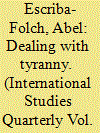

|
|
|
|
|
| Publication |
2010.
|
| Summary/Abstract |
This paper examines whether economic sanctions destabilize authoritarian rulers. We argue that the effect of sanctions is mediated by the type of authoritarian regime against which sanctions are imposed. Because personalist regimes and monarchies are more sensitive to the loss of external sources of revenue (such as foreign aid and taxes on trade) to fund patronage, rulers in these regimes are more likely to be destabilized by sanctions than leaders in other types of regimes. In contrast, when dominant single-party and military regimes are subject to sanctions, they increase their tax revenues and reallocate their expenditures to increase their levels of cooptation and repression. Using data on sanction episodes and authoritarian regimes from 1960 to 1997 and selection-corrected survival models, we test whether sanctions destabilize authoritarian rulers in different types of regimes. We find that personalist dictators are more vulnerable to foreign pressure than other types of dictators. We also analyze the modes of authoritarian leader exit and find that sanctions increase the likelihood of a regular and an irregular change of ruler, such as a coup, in personalist regimes. In single-party and military regimes, however, sanctions have little effect on leadership stability.
|
|
|
|
|
|
|
|
|
|
|
|
|
|
|
|
| 4 |
ID:
096689
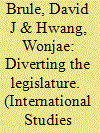

|
|
|
|
|
| Publication |
2010.
|
| Summary/Abstract |
Given distinct partisan macroeconomic preferences, the partisanship of the president or majority in Congress should influence presidential decisions to use force in the face of poor economic conditions-the diversionary use of force. But previous research posits contradictory accounts of the influence of partisanship. We seek to resolve this debate by developing a game theory model, which predicts that leaders divert when government is divided and economic conditions hurt the opposition party's constituency. Leaders seek to divert the legislature from the economy in order to prevent the legislature from passing a remedial economic bill. Analyzing US conflict behavior since World War II, we examine the conditional influence of presidential partisanship and the president's cohesive partisan support in Congress on the effects of inflation and unemployment. Consistent with the model's predictions, we find that as their cohesive partisan support in Congress declines, Democratic presidents tend to use force in response to inflation and Republican presidents tend to use force in response to unemployment.
|
|
|
|
|
|
|
|
|
|
|
|
|
|
|
|
| 5 |
ID:
096687
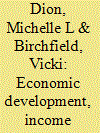

|
|
|
|
|
| Publication |
2010.
|
| Summary/Abstract |
Adopting a cross-regional and global perspective, this article critically evaluates one of the core assertions of political economy approaches to welfare-that support for redistribution is inversely related to income. We hypothesize that economic self-interest gives way to more uniform support for redistribution in the interest of ensuring that basic or relative needs are met in less developed and highly unequal societies. To test this hypothesis, we analyze individual-level surveys combined with country-level indicators for more than 50 countries between 1984 and 2004. Our analysis shows that individual-level income does not systematically explain support for redistribution in countries with low levels of economic development or high levels of income inequality. These findings challenge the universality of the assumption of economic self-interest in shaping preferences for redistribution that has been so pervasive in the literature.
|
|
|
|
|
|
|
|
|
|
|
|
|
|
|
|
| 6 |
ID:
096691


|
|
|
|
|
| Publication |
2010.
|
| Summary/Abstract |
What is the relationship between international cooperation and the success of economic sanctions? Although it is commonly assumed that international cooperation is an important condition for the effectiveness of sanctions, empirical results have been mixed. We focus on the role of the sanctioned country's major trading partners and develop a theoretical model that shows how their actions can affect the probability of sanctions success by raising or decreasing resistance costs to the sanctioned country. We then derive hypotheses from the theoretical model and test them using fully structural estimation. The empirical results lend support to the theoretical expectation that the sanctioner is more likely to succeed if it has the support of the sanctioned country's major trading partners. We also find that international cooperation may be less crucial if sanctions are imposed by the sanctioned country's main trading partner because such sanctions have a higher probability of success.
|
|
|
|
|
|
|
|
|
|
|
|
|
|
|
|
| 7 |
ID:
096690


|
|
|
|
|
| Publication |
2010.
|
| Summary/Abstract |
From the earliest years of the Internet's creation, cyberspace has been distinguished from other types of political space because of three unique qualities: (i) its ability to mobilize users, particularly "outsiders" including those who have not been easily included in political systems using conventional means; (ii) its ability to quickly provide large quantities of information of uncertain or unregulated quality; and (iii) its ability to shrink distances between users, in some sense rendering conventional physical geography irrelevant. This paper presents three lenses for interpreting the significance of these developments: utopian, liberal, and realist. Evolving doctrines of cyberwarfare as put forth by China, Russia, and the United States in particular stress the ways in which cyberspace presents a unique security threat which may present greater advantages to nonstate actors engaged in unconventional warfare. Differing economic, political, and security policies derive from each lens.
|
|
|
|
|
|
|
|
|
|
|
|
|
|
|
|
| 8 |
ID:
096696
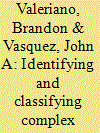

|
|
|
|
|
| Publication |
2010.
|
| Summary/Abstract |
This article takes a closer look at multiparty wars in the modern state system. Because wars are different, a classification system of interstate wars is useful for theoretical concerns and empirical testing. We label multiparty wars "complex" because we believe that the processes that bring them about are much more complicated and difficult to understand than dyadic wars. Complex wars are identified and classified on the basis of their size, the issue that gives rise to them, and whether they are preceded by certain behavioral processes. To see if the classification is empirically useful, a set of empirical expectations on which wars should differ is derived and employed to conduct a series of tests. It is found that dyadic wars are associated with different patterns from complex wars, and that within the set of complex wars, the larger wars differ from the smaller ones on several dimensions. It is also found that larger wars and wars over certain issues are likely to be preceded by different behavioral processes, especially in terms of the use of power politics practices. The classification breaks down each complex war into its component dyadic participants on a number of variables so that one can compare originating dyads with each joiner dyad to show how wars differ according to type.
|
|
|
|
|
|
|
|
|
|
|
|
|
|
|
|
| 9 |
ID:
096695
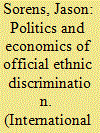

|
|
|
|
|
| Publication |
2010.
|
| Summary/Abstract |
It is argued that ethnic competition, triggers for ethnic mobilization, and political institutions together affect changes in government-imposed political and economic restrictions on ethnic groups worldwide. Due to the fact that the only existing comparative data set on ethnic discrimination, produced by the Minorities at Risk project, uses discrimination as a criterion for including ethnic groups, a new data set of 620 additional groups has been created to predict the selection process through a full-information, maximum-likelihood Heckman probit model, but selection bias is found not to affect the results. Discrimination is modeled as a dynamic Markov process, and central and regional government institutions, economic conditions, and minority group characteristics are found to influence the initiation and continuation of discriminatory policies.
|
|
|
|
|
|
|
|
|
|
|
|
|
|
|
|
| 10 |
ID:
096686
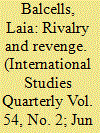

|
|
|
|
|
| Publication |
2010.
|
| Summary/Abstract |
Recent research on violence against civilians during wars has emphasized war-related factors (such as territorial control or the characteristics of armed groups) over political ones (such as ideological polarization or prewar political competition). Having distinguished between irregular and conventional civil wars and between direct and indirect violence, I theorize on the determinants of direct violence in conventional civil wars. I introduce a new data set of all 1,062 municipalities of Catalonia during the Spanish Civil War (1936-1939) and I show that the degree of direct violence against civilians at the municipal level goes up where prewar electoral competition between rival political factions approaches parity. I also show that, following the first round of violence, war-related factors gain explanatory relevance. In particular, there is a clear endogenous trend whereby subsequent levels of violence are highly correlated with initial levels of violence. In short, the paper demonstrates that an understanding of the determinants of violence requires a theory combining the effect of political cleavages and wartime dynamics.
|
|
|
|
|
|
|
|
|
|
|
|
|
|
|
|
| 11 |
ID:
096692
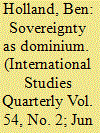

|
|
|
|
|
| Publication |
2010.
|
| Summary/Abstract |
The constructivist authors John Gerard Ruggie, Friedrich Kratochwil, and Nicholas Onuf have each independently pressed the case that the concept of state sovereignty owes its genesis to the rediscovery of the Roman law of private property in the Renaissance. This article supports this conclusion, but argues that it was the notion of representation that Roman property law bequeathed which was of such significance. It makes this argument through analyses of the writings of Hobbes (on the temporally permanent state), Montesquieu (on the territorially bounded state), and Sieyès (on the nation-state). It thus provides a fresh account of the rise of the nation-state within the framework of a powerful series of analyses of sovereignty that have been posited by scholars in the discipline of International Relations.
|
|
|
|
|
|
|
|
|
|
|
|
|
|
|
|
|
|
|
|
|